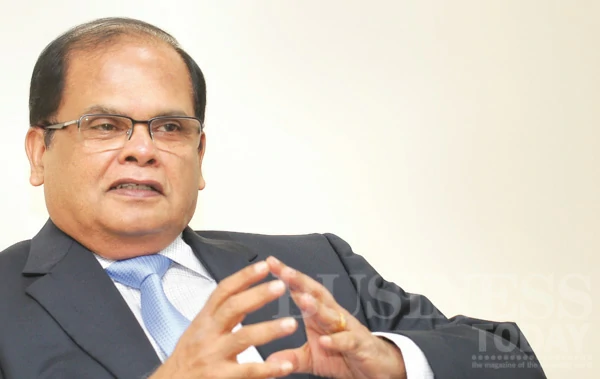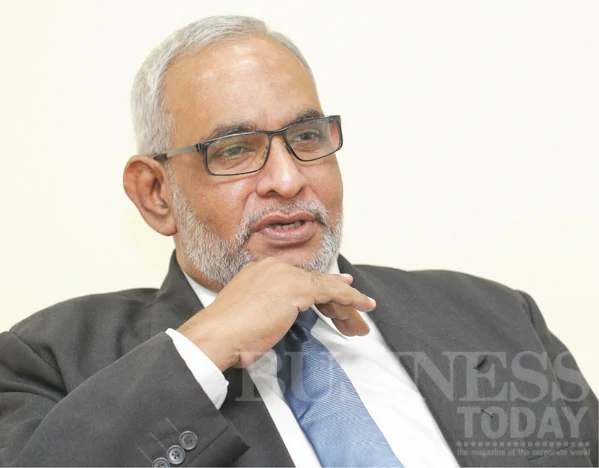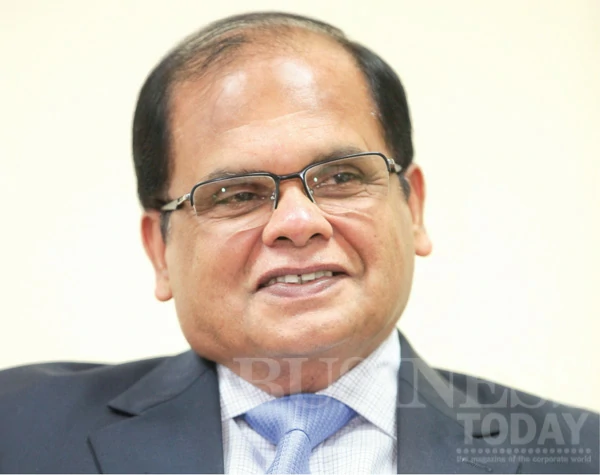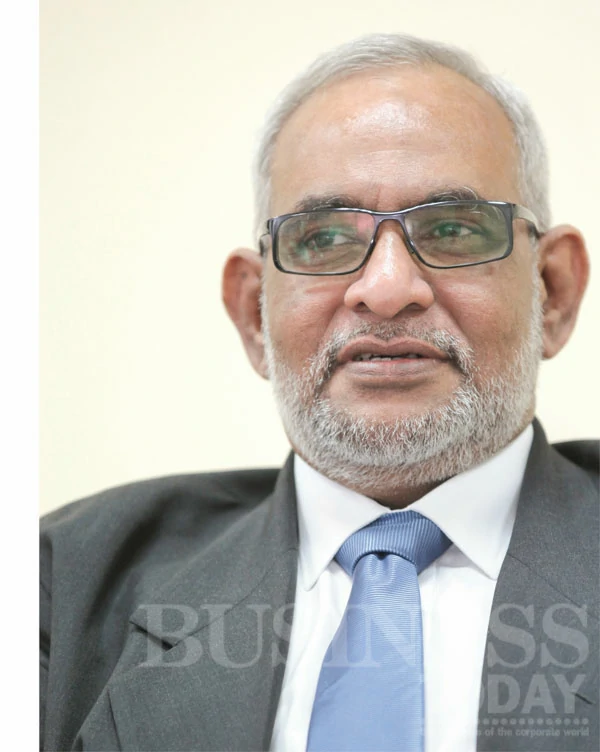
Commercial Bank welcomed its new Chairman, Dharma Dheerasinghe and Managing Director/CEO Jegan Durairatnam signifying the next chapter of the largest private bank in Sri Lanka. The Chairman comes with extensive experience in policy and the public sector, where he has played a significant role in the monetary and financial spheres. The Managing Director is a product of Commercial Bank, where he has climbed the ladder slowly and steadily to reach the top gaining experience in all aspects of the Bank.
Essentially Commercial Bank has the best of both worlds at its helm. As such we can expect greatness from this Bank as it continues to focus on its core values where the customer is always number one.
By Udeshi Amarasinghe Photography Mahesh Bandara and Indika De Silva
Can you elaborate on your background and previous experience?
Chairman: After completing my undergraduate degree, I joined Bank of Ceylon as a Sub Manager in 1975. I was at Bank of Ceylon for 18 months and then joined the Central Bank in 1976. Thereafter, I completed my Masters at Leeds University in England in 1980. I returned to Sri Lanka in 1982, to join the Economic Research Department of the Central Bank as an Economist and was subsequently promoted to the post of Senior Economist.
I married my colleague at the Research Department and the rule was that spouses cannot work in the same department. As such I was transferred to the Statistics Department as a Senior Assistant Director. I was promoted to the post of Deputy Director – Information Technology. And, in 1994 I was appointed as the Deputy Superintendent of Public Debt, then Additional Superintendent in 1998 and as the Superintendent in 2000. I was in this department for ten years and I consider this as some of my best years at the Central Bank.
As the Superintendent of Public Debt, I was able to introduce many new initiatives. The auction of treasury bills was held manually, but I changed this to electronic auctions. Then, debt instruments such as treasury bonds were first issued in 1996. The structuring of the treasury bond was done by me. At that time there was a fear of whether we would be able to market such an instrument. It has now become the most popular debt instrument in Sri Lanka, which has a portfolio of about two and a half trillion rupees.
We Must Pay Tribute To The Pioneers Of This Bank. Commercial Bank Has Been In Existence For 45 Years. We Started Small And Have Been Growing Leaps And Bounds Over The Years. Everyone, From Board Level, Management To Branch Level… Must Take Credit For Making Commercial Bank The Largest Private Sector Bank In Sri Lanka.
Initially treasury bills and bonds were issued on paper, but in 2001 we decided to issue scripless treasury bills and bonds. All the paper certificates that had been issued until that point of time were digitalised. Today, the central depository of treasury bills and bonds amount to four trillion rupees. Then the Sri Lanka development bond was also structured by me. This too is a very popular debt instrument, which is issued domestically but denominated in dollars.
One other milestone is the introduction of primary dealers in treasury securities. Primary dealers are doing very well and they are also part and parcel of the debt market today. There is a well developed secondary market in government securities, treasury bills and treasury bonds, which is appreciated by many people around the world. We have many officials from Asian countries, especially from the SAARC region visiting Sri Lanka to study our systems in the debt securities market.
I was promoted to the position of Assistant Governor of the Central Bank in 2004 and then posted to Washington as the alternate Executive Director at the IMF for India, Sri Lanka, Bangladesh and Bhutan in concurrence with these countries in 2007. I was in this position for two and a half years when I was promoted as the Deputy Governor of the Central Bank in 2009. I retired from the Central Bank as the Senior Deputy Governor in November 2011. And I was appointed to the Board of Commercial Bank on December 20, 2011. I had been a member of the Board for only ten days when I was appointed Deputy Chairman of the Board. On the retirement of Mr Dinesh Weerakkody on July 29, 2014, I was elected as the Chairman of the Board by the directors.
A Bank Of Our Size Has A Special Place In The Economy. While We Are Experts At Managing The Bank And Giving What A Customer Wants, The Forward Vision And Its Place In The Economy Is Something That We Need Guidance On. Our Chairman Having Been A Deputy Governor… Gives Us That Edge.
MD: I do not have such a distinguished background as the Chairman, mine is much simpler than that. I completed my degree at the University of Peradeniya. I joined Commercial Bank soon after as a management trainee and have been here for 32 years. I have worked in every department of the Bank. I first completed my training in personal and corporate banking and then moved on to international banking. From the Bank’s international division I managed our acquisition in Bangladesh. And then rose to the positions of AGM International, DGM International, Chief Operating Officer and finally, Managing Director/CEO.
With the Chairman coming from a policy and state sector background and MD from a commercial and private sector background, how will you draw on your combined experience to take the Bank forward?
MD: A bank of our size has a special place in the economy. While we are experts at managing the Bank and giving what a customer wants, the forward vision and its place in the economy is something that we need guidance on. Our Chairman having been a deputy governor, a very senior economist and an IMF nominee gives us that edge. His experience gives us the focus of creating the right mix at Commercial Bank that will suit our current economy. We feel that this is a wonderful fit.
Chairman: The combination between the state and private sector expertise is greatly beneficial in driving the business forward. It imparts a very strong balance in making decisions both on a macro and micro level, giving the best to the customers, shareholders and the society at large. Our MD, Mr Jegan Durairatnam has risen to greater heights within the industry as well as within Commercial Bank spearheading all the important areas of the business. With a wealth of knowledge combined with proven hands on experience in banking, he is a pragmatic and upright individual who constantly creates and maintains excellent rapport with all key stakeholders of the bank.
What are your plans for Commercial Bank in terms of services and facilities?
MD: We always focus on our core values. Stability and the strength of the balance sheet are the most important aspects. Whatever we do we will maintain our core values. Commercial Bank is known to have a focus on trade and therefore with our experience in Bangladesh we will certainly look for other markets to replicate that success. That is one aspect.
The Combination Between The State And Private Sector Expertise Is Greatly Beneficial In Driving The Business Forward. It Imparts A Very Strong Balance In Making Decisions Both On A Macro And Micro Level, Giving The Best To The Customers, Shareholders And The Society At Large.
We are very strong in the SME sector though many people do not realise this. We have nurtured this sector and the statistics indicate that we are one of the leading players in developing SMEs. We are very proud of this achievement and we will continue to grow in this sector as well.
Chairman: We must pay tribute to the pioneers of this Bank. Commercial Bank has been in existence for 45 years. We started very small and have been growing leaps and bounds over the years. Everyone, from the board level, management to branch level, which is the grass roots of this Bank must take credit for making Commercial Bank the largest private sector bank in Sri Lanka. We have been the best bank in the country for 16 consecutive years. And the only bank in the first 1,000 banks in the world for four consecutive years.
Will Commercial Bank look at further expansion in Sri Lanka and overseas?
MD: We will certainly expand further in Sri Lanka because there is room to do so. The economy of the country is booming and we are looking at becoming a one trillion rupee bank as the country reaches USD 4,000 in per capita GDP by 2016. In that sense we will have a close focus on the Sri Lankan market. However, with our experience in Bangladesh we will always look at other markets.
Chairman: Commercial Bank has done very well in our overseas expansion where we have 18 delivery points in Bangladesh, which gives us about 15 percent of our bottom line. We are looking at further overseas expansion in few other countries in the region, in as much as we are looking at domestic expansion. We have the largest ATM network by a single bank, which is 599 ATMs and we will be over 600 very soon.
We have the operational efficiency to cater to our customers needs. We are a customer centric bank where our culture is very different. We do not recruit at different levels. We recruit most of our staff at junior positions where they are trainees. We provide them with the necessary training and then give them positions at our branches. They work together with the customers and as such they are able to understand the customers needs very well. We have developed this culture and we will ensure that this continues. We are looking at further domestic expansion as well.
What are your thoughts on the banking sector in Sri Lanka and is there a need to strengthen it further? Can you elaborate on the Central Bank’s role in ensuring stability?
MD: Sri Lanka has a well regulated banking sector. This gives the people of this country great comfort, knowing that the banking sector is stable. Compared to other countries in the region, the information that is available on banks and the transparency of that information is substantial and world class. It is easy for a foreign investor to look and understand the operations of a bank and take a decision as to whether he is prepared to invest or not. We have seen many foreign companies investing in local banks. In that sense the banking sector is a well regulated and dynamic industry in Sri Lanka, compared to the rest of the region.
We Will Certainly Expand Further In Sri Lanka Because There Is Room To Do So. The Economy Of The Country Is Booming And We Are Looking At Becoming A One Trillion Rupee Bank As The Country Reaches USD 4,000 In Per Capita GDP By 2016. However, With Our Experience In Bangladesh We Will Always Look At Other Markets.
Chairman: Banking is a regulated industry anywhere in the world and there will be competition within that framework. As far as compliance is concerned we are regulated by the Central Bank and we always make it a point to be compliant with the regulator and to be efficient within that competitive framework. We have the edge at the moment in terms of cost and cost recovery. We have made the biggest profits by any private bank in the last few years. We focus on two sectors in terms of our core business, which are corporate banking and personal banking.
About 60 percent of our business is in personal banking, including SMEs. And we have a highly diversified customer base; from very small customers, micro credit to corporates though they do not fall within the category of corporate banking. It is a very challenging business proposition when it comes to lending because you take the credit risk with the customer. Most of the retail customers are not in the formal sector. They may not be quoted companies nor a private limited liability company.
We are also offering our services to the North and East. We need to cater to these areas as well. Financial literacy is a major requirement in the North and East as well as Uva, Sabaragamuwa and North Central provinces. The people in these areas are not aware about the facilities provided by a bank. Therefore, it is a matter of educating and reaching out to those people, extending credit and other facilities.
Commercial Bank has been a contributor to the development of the country, can you elaborate on this including support to SME?
MD: We are one of the biggest players in the SME sector. We feel that SMEs are certainly the engine of growth of this country. And we will continue to support them by providing training as well as financial products. In that sense we will always look to support the economy of not only the Western Province but other areas as well. A substantial portion of our business, comes from outside the Western Province and it is necessary that these businesses are strengthened to reach global standards so that we can succeed as a country.
We Are One Of The Biggest Players In The SME Sector. We Feel That SMEs Are Certainly The Engine Of Growth Of This Country. And We Will Continue To Support Them By Providing Training As Well As Financial Products.
Chairman: If we look at corporate banking, we have both private as well as state owned enterprises as our clientele. In terms of development and taking into account the national interest of this country, Commercial Bank is proud to have been part of infrastructure development in the country where we have lent to the corporates, both private and state in their efforts. We will continue to be a partner in these activities.
Usually a bank will look at the business side of an investment, however when we take a long term view and in the best interest of the country Commercial Bank will always support development projects.
If you look at the overall strategies of the government, consolidation of the banking and finance sector has been seen as a positive development in ensuring a stable and strong system in Sri Lanka. What are your thoughts on that?
MD: Commercial Bank would have continued to develop as a bank if not for the consolidation initiative that was brought forward. We started looking at a few companies to enter a space that we would not have done so otherwise where the risk profile and cost structure is different. In that sense it has been a big opportunity for us. We will take part in the consolidation effort and we have already announced that we are in the process of buying a finance company. We will try and grow in that space as an investment.
Chairman: Consolidation is something everyone must look at positively. We have 58 finance companies and leasing companies in Sri Lanka at the moment and this will be a regulator driven consolidation process where the number will be brought down to 20. By doing that you will have bigger finance and leasing companies. A number of finance and leasing companies are merging and some of those companies are being acquired by banks. This will result in larger institutions, which are less likely to collapse.
We had too many small finance companies and leasing companies. There is a risk on one hand and on the other the cost is high in a small entity. By merging or consolidating, these small institutions are being bought over by large institutions. As they grow bigger the cost will become less. The ultimate beneficiaries of low cost lending are the customers. This is a very favourable development and the initiative of consolidation is progressing very well at the moment.
What are your thoughts on the overall growth in assets in the banking sector?
MD: Even though Commercial Bank is very big in Sri Lanka, internationally we are still considered very small. We need to increase the size of the balance sheet in order to be taken notice of. As such Commercial Bank will be a part of that growth process and we will aim to achieve the national goal of a one trillion rupee asset base, where the country will have a certain number of banks with that strength.
Being Pioneers In Many Convenience-Based Banking Endeavours, Highly Driven By Technology, We Cater To The Present As Well As Future Generations. Our Efforts Focus More In Driving Banking Services To Suit The Evolving Needs Of All Segments Of Customers Whilst Playing A Leading Role In The Upliftment Of The Sri Lankan Society At Large.
Chairman: We have a number of banks and some may be considered large in this market. But in terms of global standards they are small banks. We need to have big banks with large balance sheets. Commercial Bank will be a one trillion balance sheet bank in 2016. Thereafter we will be able to grow further. Of course for the economy to have a stable financial system you need to have stable financial institutions. We are contributing towards that national goal.
Final thoughts?
MD: Banking is a tough industry. Commercial Bank is a reasonably conservative bank but we use technology extensively in our operations.
One of our core values is convenience for our customers and that is what we will always strive for. We will always look at introducing new technologies and models to enhance and upgrade the banking industry in this country.
Chairman: Providing the best of banking services to our valued customers with the most modern and relevant products whilst keeping all stakeholders at heart, are key to our success. Being pioneers in many convenience-based banking endeavours, highly driven by technology, we cater to the present as well as future generations. Our efforts focus more in driving banking services to suit the evolving needs of all segments of customers whilst playing a leading role in the upliftment of the Sri Lankan society at large.








